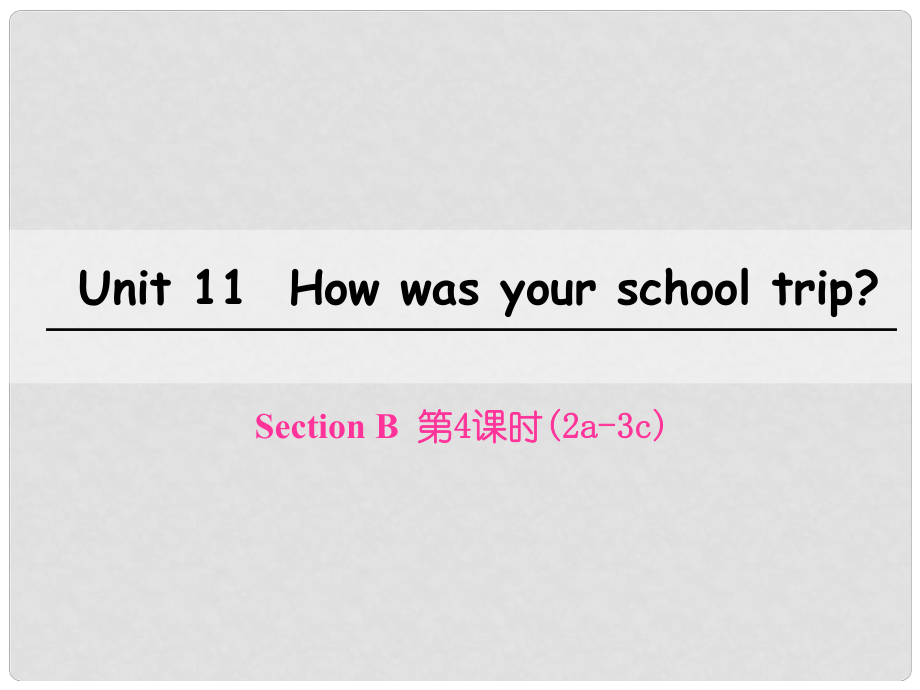《七年級(jí)英語(yǔ)下冊(cè) Unit 11 How was your school trip(第4課時(shí))Section B(2a3c)課件 (新版)人教新目標(biāo)版》由會(huì)員分享���,可在線閱讀�,更多相關(guān)《七年級(jí)英語(yǔ)下冊(cè) Unit 11 How was your school trip(第4課時(shí))Section B(2a3c)課件 (新版)人教新目標(biāo)版(19頁(yè)珍藏版)》請(qǐng)?jiān)谘b配圖網(wǎng)上搜索�。
1、Unit 11 How was your school trip?Section B 第第4 4課時(shí)課時(shí)(2a-3c)(2a-3c) excitingadj. 使人興奮的使人興奮的 令人激動(dòng)的令人激動(dòng)的lovelyadj. 可愛的可愛的expensiveadj. 昂貴的昂貴的cheap adj. 廉價(jià)的�����;便宜的廉價(jià)的���;便宜的slow adj. 緩慢的�����;遲緩的緩慢的�����;遲緩的fastadj. 快的快的robotn. 機(jī)器人機(jī)器人guiden. 導(dǎo)游;向?qū)?dǎo)游�����;向?qū)?a Do the following words describe good things or bad things? Put a
2、for good and an for bad. Leave a blank if they can mean both. _ interesting _ difficult _ lovely _ slow _ exciting _ boring _ cool _ hot _ lucky _ large _ expensive _ terrible _ delicious _ great _ cheap _ fast2b Read Helens and Jims diary entries and answer the questions. 1. Did Helen and Jim go on
3���、 the same trip?2. How do they feel about the trip?Yes, they did. They went on the same trip.Helen thought the trip was really interesting. But Jim thought the trip was terrible.2c Complete the chart. How do Helen and Jim describe these things? Helen Jim the trip the train the museumthe gift shop and
4���、 giftsexcitingfastreally interestinglovely, not expensiveterribleslowbig, boring, dark, too many peopleso expensive3a Look at the pictures of Bobs school trip. Complete his diary entry. June 23rdYesterday my school visited the zoo. It was really _. We went there by bus. At the zoo, I saw a lot of _
5、and I took some photos. My classmates and I also went to the _ and bought some _. It was a great day. interestinganimalsgift shopgifts3a3b. Linda is Bobs classmate. Completeher diary entry. June 23rdMy school went to the zoo yesterday. The trip was _.At the zoo, I _ but I didnt like them. I also wen
6���、t to _ with my classmates, but I didnt buy anything because _. It was a boring day. terrible saw some animals gift shopthey are expensive3c Now write a diary entry for your own school trip. Explain if you liked it or didnt like it and why. You may include the following questions in your diary1) What
7�����、 was the date?2) Where did you go?3) How was the trip?4) How did you go there?5) What did you see?/ What did you do?6) Did you like it? Last week, my school went to a farm. The school trip was interesting. I saw a lot of animals. I rode a horse on the farm.I climbed the mountain. I also milked a cow
8�����、. My classmates and I picked some strawberries. They were delicious. The trip was really funny.Language points1. All in all,it was an exciting day.(1)all in all 意為意為“總之���,總的來(lái)說總之,總的來(lái)說”�����,常放在常放在句子開頭句子開頭���。如:如:Sometimes she is grouchy, but all in all she is an excellent teacher. 有時(shí)候她的脾氣很壞有時(shí)候她的脾氣很壞, 但總的來(lái)說她還是但
9�、總的來(lái)說她還是一位好老師一位好老師. Language points(2)exciting用來(lái)用來(lái)指物指物,意思為���,意思為“令人興奮令人興奮的�����,令人激動(dòng)的的�����,令人激動(dòng)的”�����。如:如:That is an exciting book. 那是本有趣的書���。那是本有趣的書。excited用來(lái)用來(lái)指人指人���,意為,意為“興奮的���,激動(dòng)的興奮的�����,激動(dòng)的”�。如:如:She was excited to learn the news. 她聽到這消息很興奮。她聽到這消息很興奮�。Language points2. Everything was about robots and Im not in interested
10、in that.(1)interested是是形容詞形容詞�,意為,意為“有趣的有趣的”�,主語(yǔ)主語(yǔ)是人是人。常用于句型:���。常用于句型:be interested in sth.意為意為“對(duì)對(duì).感興趣感興趣”�。如:如:We are very interested in what he said. 我們對(duì)他所說的很感興趣���。我們對(duì)他所說的很感興趣�。 (2)interesting是是形容詞形容詞�����,意為�����,意為“有趣的有趣的”,是�����,是形形容物和事件的容物和事件的�����,主語(yǔ)是物體或事情主語(yǔ)是物體或事情���。如:如:Studying English is very interesting. 學(xué)習(xí)英語(yǔ)是很有趣的�����。學(xué)習(xí)英語(yǔ)是很有趣的���。小結(jié)訓(xùn)練小結(jié)訓(xùn)練1. We _ _ _ (對(duì)對(duì).感興趣感興趣) the robots.2. There are _ _ (太多太多) rules at my home.3. Can you teach me how _ _ (use) a computer?4. I know how _ _ (spell) the word.5. Its easy _ _ (learn) English. are interested in too many to use to spell to learn完成當(dāng)堂測(cè)評(píng)作業(yè)完成當(dāng)堂測(cè)評(píng)作業(yè). .
 七年級(jí)英語(yǔ)下冊(cè) Unit 11 How was your school trip(第4課時(shí))Section B(2a3c)課件 (新版)人教新目標(biāo)版
七年級(jí)英語(yǔ)下冊(cè) Unit 11 How was your school trip(第4課時(shí))Section B(2a3c)課件 (新版)人教新目標(biāo)版

